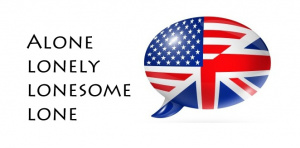Difference between revisions of "Language/English/Vocabulary/Alone,-lonely,-lonesome-and-lone"
< Language | English | Vocabulary
Jump to navigation
Jump to search
| Line 1: | Line 1: | ||
[[File:Alone, lonely, lonesome and lone.jpg|thumb]] | [[File:Alone, lonely, lonesome and lone.jpg|thumb]] | ||
<div style="font-size:300%;"> Alone, lonely, lonesome and lone</div> | |||
'''Alone means ‘without others around’. Lonely (and informal American English lonesome) means 'alone and unhappy because of it’.''' | '''Alone means ‘without others around’. Lonely (and informal American English lonesome) means 'alone and unhappy because of it’.''' | ||
| Line 6: | Line 6: | ||
Compare: | Compare: | ||
I like to be alone for short periods. | *I like to be alone for short periods. | ||
*But after a few days I start getting lonely/lonesome. | |||
'''Alone can be emphasised by all.''' | '''Alone can be emphasised by all.''' | ||
| Line 14: | Line 16: | ||
Example: | Example: | ||
After her husband died, she was all alone. | *After her husband died, she was all alone. | ||
'''Alone is not used before a noun. Lone and solitary can be used instead; lone is rather literary.''' | '''Alone is not used before a noun. Lone and solitary can be used instead; lone is rather literary.''' | ||
| Line 20: | Line 24: | ||
Example: | Example: | ||
The only green thing was a lone/solitary pine tree. | *The only green thing was a lone/solitary pine tree. | ||
Revision as of 21:30, 13 May 2020
Alone, lonely, lonesome and lone
Alone means ‘without others around’. Lonely (and informal American English lonesome) means 'alone and unhappy because of it’.
Compare:
- I like to be alone for short periods.
- But after a few days I start getting lonely/lonesome.
Alone can be emphasised by all.
Example:
- After her husband died, she was all alone.
Alone is not used before a noun. Lone and solitary can be used instead; lone is rather literary.
Example:
- The only green thing was a lone/solitary pine tree.
